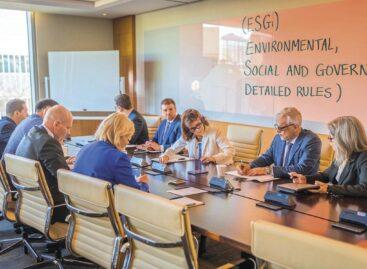MNB vice-president: the first step on the road to the green transition is to reduce inflation
The first step on the road to sustainable growth and the green transition is to break down and quickly reduce inflation, because a high inflation environment “regardless of its color” hinders all investments, said Barnabás Virág, vice-president of the Magyar Nemzeti Bank (MNB) and the Hungarian Economic Association (MKT ) and at the online panel discussion of the Hitelintézeti Szemle “Decarbonization in Finances”.

(Photo: Pixabay)
In recent years, the central bank has adopted a special strategy and a number of steps with which it can help the green transition of the economy, he said. He reminded: in May 2021, the Hungarian Parliament awarded the Hungarian National Bank with a green mandate, the first in Europe, thereby making the promotion of environmental sustainability one of its statutory goals, after the primary goal of ensuring price stability. According to the vice-president of the central bank, it is necessary to look for the “acceleration paths” through which it is possible to reduce the energy consumption of the Hungarian economy and create energy independence. The rise in energy prices increased the country’s energy imports by ten billion euros last year. In his presentation, Péter Pál Kolozsi, director of the MNB and associate professor of the Center for Sustainable Finance at the MNB Knowledge Center of the Neumann János University, addressed the dilemma that central banks must simultaneously meet the fulfillment of price stability goals and the expectation that they participate in ensuring the green transition.
Climate change affects monetary policy in a complex way through several channels, and the impact on inflation stands out among these
Due to the physical consequences and effects of climate change, floods, droughts, or extreme temperature fluctuations, food and energy prices may rise, and these may affect inflation expectations. He emphasized: the economic effects of climate change extend beyond the 5-8 quarter time horizon of monetary policy decisions. The increase in the price of raw materials, which are particularly affected by the green transition, can be permanent, and the central banks must also take into account the inflationary effects of this. The costs of transitioning to a sustainable economic model in the next 10-15 years could reach the total amount of the global gross domestic product, about 100 thousand billion dollars, he added. Central banks can encourage the transition by reducing the funding costs of sustainable investments, by purchasing green securities or through green credit programs, he said. He emphasized: the green transition cannot be implemented without the financial system becoming much greener than the current one, and central banks have an important role in this.
Sándor Winkler, head of department at the MNB, presented a study examining the effects of energy ratings on the housing market
He said: In Hungary, residential buildings account for a third of the final energy consumption, while the energy efficiency of the domestic housing stock is low, and the proportion of properties with nearly zero energy requirements within the total stock is negligible. The study reveals that a kind of “green price premium” can be detected on the market of new apartments in the capital. Apartments with an energy rating of BB or better are on average 5.1 percent more expensive than apartments with an energy rating of CC, however, despite the lower credit risk, the loan interest rates for these properties do not differ significantly, meaning that banks do not currently apply energy considerations in the pricing of loans. . According to Sándor Winkler, this also points to the need for green loan products, including market-based green housing loans.
MTI
Related news
The majority of Hungarians spend less than 50 thousand forints on Christmas gifts, sustainability is an important aspect, but not the primary one
Gift-giving is an essential holiday tradition, but what really matters…
Read more >Lidl has published its 3rd sustainability report
Lidl Hungary’s sustainability report for the 2022/2023 business years has…
Read more >ESG – about sustainability standards, from a legal perspective
Since December 2023 several pieces of legislation have been published…
Read more >Related news
The Joy of Giving! – SPAR stores collect non-perishable food for people in need
The Hungarian Maltese Charity Service and SPAR Hungary have launched…
Read more >Technological advancements and business travel
The latest research from International Workplace Group (IWG), the leading…
Read more >K&H: a gift, but what and from which store?
When it comes to Christmas gift-giving, clothes are the most…
Read more >








